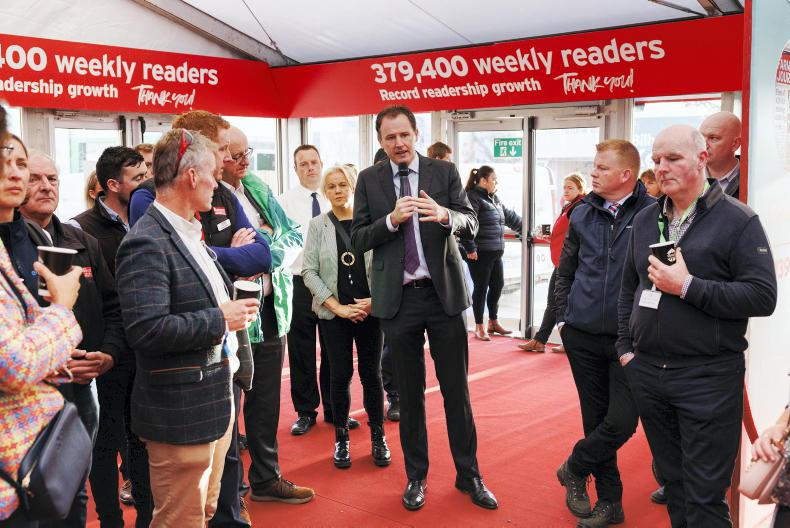It is not right or just that those who followed official guidelines should now be penalised for doing what was asked of them. This is what is happening to the relatively small number of farmers who were encouraged – through Government policy – to develop their farm business by entering into long-term land leases. Policy encouraged the value of entitlements to be woven into lease arrangements, allowing for both the land rent and entitlement value to be passed to the landowner tax-free.In 2023, the capping of BISS payments will mean that these farmers will be unable to draw down all of these entitlements despite being committed to lease arrangements that have a number of years still to run.
It is not right or just that those who followed official guidelines should now be penalised for doing what was asked of them. This is what is happening to the relatively small number of farmers who were encouraged – through Government policy – to develop their farm business by entering into long-term land leases. Policy encouraged the value of entitlements to be woven into lease arrangements, allowing for both the land rent and entitlement value to be passed to the landowner tax-free.
In 2023, the capping of BISS payments will mean that these farmers will be unable to draw down all of these entitlements despite being committed to lease arrangements that have a number of years still to run.
Entitlements
Tillage farmers are among the worst affected because many of them depend almost totally on rented land and entitlements. If a farmer has access to, say, €100,000 worth of entitlements, most of which are rented, he/she can now only draw down €66,000 in BISS payment. So which lease arrangements will not get paid? The active farmer can ill afford to pay the full lease agreements if entitlements cannot be drawn down. If the farmer does not pay the agreed price, he/she may lose some or all of the land when the arrangement ends. Whatever action is taken, many of the farmers affected could well see their livelihoods threatened by this scenario.
The problem is not of their own doing. These farmers followed policy incentives set out by the Department. They opted for longer-term leases to help make more productive and more sustainable use of the land but now these leases are effectively a millstone around their necks. After they conclude, all new arrangements can be based on the new rules and the capping limit. In the meantime, these businesses are threatened by the unwillingness to address the problem in a pragmatic way.
Abandoned
These farmers appear to have been abandoned by their farming organisations with the issue not seemingly relevant due to the small numbers affected. But to simply allow Government implement new policy measures without any regard as to the impact on those who responded to previous long-term policy incentives sets a very dangerous precedent that exposes all farmers into the future.

Minister for Agriculture Charlie McConalogue speaking during the Irish Farmers Journal Breakfast Briefing at the National Ploughing Championships at Ratheniska, Co. Laois. \ Donal O' Leary
It is important to highlight that the farmers concerned do not challenge the cap on BISS payments, only the interim arrangements that would enable a just transition between the two CAP regimes. It would appear to be a very shoddy approach by Department officials who allowed a direct conflict to occur between their policy incentives and what they agreed in the new CAP. Surely we should expect that our negotiators would not wish to trap individuals in arrangements that have complied with national incentives like longer-term leasing.
Conacre
For the majority of these farmers, the leased-in entitlements are merely passed through their hands. They arrive in the bank and must immediately be passed back to landowners. Ironically, if farmers had remained with the conacre system, this would not be an issue as rental arrangements could immediately reflect the new payments.
The problem is ultimately the crossover between the periods of the lease and the timing of the new CAP. Agreements made in good faith between landowners and land users cannot now be honoured through a combination of the capping and CRISS measures.
Is it too much to expect that Minister for Agriculture Charlie McConalogue and his Department instigate measures that would allow such arrangements to play out to protect payments for the duration of leases?
The Department could have opted to use permanent labour to offset some or all of the capping threshold, but this was not done. Regulation 2022/2115 left “ample freedom for member states to design the mechanism of capping and degressivity according to their needs”. Does this lack of consideration mean that these progressive farmers do not matter?
Promoting crop production
It is difficult to understand why the minister has not acted to sort out this problem given that he wants to promote crop production. Farm labour has long been an integral part of rural life.
Most concerned accept that it is the crossover period of existing leases and the introduction of the new CAP that is the issue. Once these leases work through, the new rules would mean different lease arrangements.
With a number of potential solutions already in the rear view mirror, the Departments of Agriculture and Revenue now need to put a plan in place to incentivise the purchase of leased-in entitlements by those active farmers who are caught with ongoing leases. As things stand, they are paying for the full value of leased-in entitlements but they will only get a fraction or none of that value back in future BISS payments.
The lesson from this situation is that legal arrangements between farmers and landowners be facilitated to enable them to play out between major policy changes.





SHARING OPTIONS: